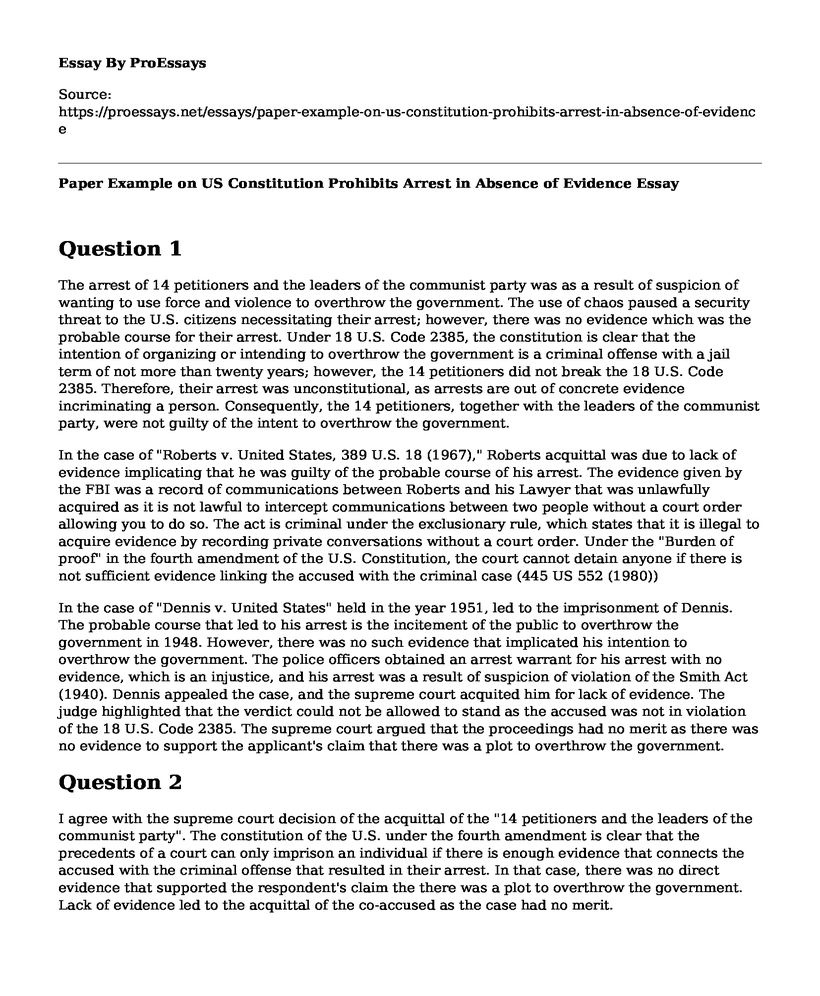Question 1
The arrest of 14 petitioners and the leaders of the communist party was as a result of suspicion of wanting to use force and violence to overthrow the government. The use of chaos paused a security threat to the U.S. citizens necessitating their arrest; however, there was no evidence which was the probable course for their arrest. Under 18 U.S. Code 2385, the constitution is clear that the intention of organizing or intending to overthrow the government is a criminal offense with a jail term of not more than twenty years; however, the 14 petitioners did not break the 18 U.S. Code 2385. Therefore, their arrest was unconstitutional, as arrests are out of concrete evidence incriminating a person. Consequently, the 14 petitioners, together with the leaders of the communist party, were not guilty of the intent to overthrow the government.
In the case of "Roberts v. United States, 389 U.S. 18 (1967)," Roberts acquittal was due to lack of evidence implicating that he was guilty of the probable course of his arrest. The evidence given by the FBI was a record of communications between Roberts and his Lawyer that was unlawfully acquired as it is not lawful to intercept communications between two people without a court order allowing you to do so. The act is criminal under the exclusionary rule, which states that it is illegal to acquire evidence by recording private conversations without a court order. Under the "Burden of proof" in the fourth amendment of the U.S. Constitution, the court cannot detain anyone if there is not sufficient evidence linking the accused with the criminal case (445 US 552 (1980))
In the case of "Dennis v. United States" held in the year 1951, led to the imprisonment of Dennis. The probable course that led to his arrest is the incitement of the public to overthrow the government in 1948. However, there was no such evidence that implicated his intention to overthrow the government. The police officers obtained an arrest warrant for his arrest with no evidence, which is an injustice, and his arrest was a result of suspicion of violation of the Smith Act (1940). Dennis appealed the case, and the supreme court acquited him for lack of evidence. The judge highlighted that the verdict could not be allowed to stand as the accused was not in violation of the 18 U.S. Code 2385. The supreme court argued that the proceedings had no merit as there was no evidence to support the applicant's claim that there was a plot to overthrow the government.
Question 2
I agree with the supreme court decision of the acquittal of the "14 petitioners and the leaders of the communist party". The constitution of the U.S. under the fourth amendment is clear that the precedents of a court can only imprison an individual if there is enough evidence that connects the accused with the criminal offense that resulted in their arrest. In that case, there was no direct evidence that supported the respondent's claim the there was a plot to overthrow the government. Lack of evidence led to the acquittal of the co-accused as the case had no merit.
In the U.S. constitution amendment 4 under the "Burden of proof, the" judge should acquit the accused if there is no evidence linking the accuse linking the criminal offense. In the case of the "14 petitioners and the leaders of the communist party," the investigative bodies provided no satisfactory evidence that the co-accused were involved in the plot to overthrow the government, which is a criminal offense under 18 U.S. Code 2385. Therefore, the supreme court jury was to acquit the accused.
Cite this page
Paper Example on US Constitution Prohibits Arrest in Absence of Evidence. (2023, Jul 24). Retrieved from https://proessays.net/essays/paper-example-on-us-constitution-prohibits-arrest-in-absence-of-evidence
If you are the original author of this essay and no longer wish to have it published on the ProEssays website, please click below to request its removal:
- Playing God: Death Penalty Cons
- Essay Example on Change of Immigration Laws
- Immigration Act of 2016 Essay
- Research Paper on Violence and Brutality on the US-Mexico Borders
- Fourth Amendment: Securing Citizens' Right to Privacy - Essay Sample
- Essay Example on the Crucial Role of Military: Securing Nations & Peace
- Free Essay Sample on Media Fear of Crime: Linked Subjects and US Crime Rate







